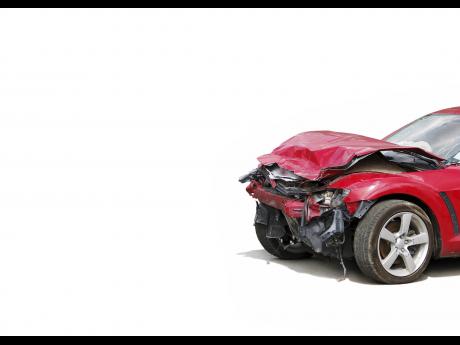Published:Sunday | November 29, 2015
QUESTION: I was involved in a single vehicle accident in June. We were driving along the Duncan’s Highway in Trelawny. It was raining heavily and our vehicle picked up a skid. We ended up in a ditch. I am the owner of the vehicle. Three other persons were in the car with me. Someone else was driving. The car was extensively damaged. The last valuation was done on May 21, 2013. The market value at the time was $1.6 million with a forced sale value of $1.36 million.
My insurers have offered two settlement options, both of which are based on a pre-accident value of $1.15 million. Option A: pre-accident value less salvage value ($240,000) less excess ($57,500) = settlement of $852,500. Option B: pre-accident value minus excess ($57,500) = settlement of $1,092,000. Which one should I accept? I have been paying premiums for two years on a car that was valued $1.6 million. Could its value have declined by 28 per cent or, $450,000, in such a short time? Are the medical expenses that I paid on behalf of the passengers reimbursable? What about my loss of use expenses?
– K.T.G.
INSURANCE HELPLINE: I am very sorry to learn about your recent mishap. I hope that you and the other passengers have fully recovered from your injuries and what must have been a frightening experience.
When we spoke, you said that you learnt from nearby residents that similar accidents are always taking place in that location. Do you recall seeing a ‘Caution: Road Slippery When Wet’ sign? If a sign was absent, perhaps you could suggest to your insurers to partner with the Road Safety Unit in the Ministry of Transport and Works to place a sign to warn other motorists.
There are a few other things that I would like to get off my chest before discussing your case. The first is that insurers generally use the estimate of a vehicle’s value to calculate the premium. The estimated value is, simply, a convenient tool to use. If you were to insure your vehicle for ‘x’, it does not mean that you will get ‘x’ in the event of loss.
Some persons who buy motor insurance with this expectation are disappointed when they learn otherwise. The policy or contract – which most persons don’t read – contains a statement that reads: “The most we will pay (in the event of loss or damage) will be the “lower of (1) the market value of your vehicle or (2) the amount you insured your vehicle for”.
Even though nearly $16 billion was spent with insurance companies during 2014 to insure motor vehicles, very few persons who work in that industry have a basic understanding of how a combustion engine works. Fewer still know anything about the many factors that influence the retail price or market value of a particular vehicle at a particular time.
Insurers rely on loss adjusters for this information. All loss adjusters are not created equal. They are known to make mistakes. Valuations should not be taken as gospel in the absence of reasonable, credible, and transparent assumptions.
A former president of the Loss Adjusters Association of Jamaica, according to a report carried in this newspaper on June 28, 2015, stated that motor loss adjusters who valued vehicles and produced valuation reports received their training at the College of Insurance and Professional Studies and the Jamaica-German Automotive School, and that lots of experience complemented the training. It was not clear from the article and the valuation reports that I have examined over time what kinds of data – proprietary and otherwise – and assumptions informed valuation decisions.
Bank of Jamaica data indicates that the value of the local currency moved downwards by 18.2 per cent during the period May 2013 to June 2015 when compared to the US dollar. The $1.6 million valuation on your vehicle in 2013 fell by 28 per cent during the same period. As a layman, I feel that if the 2013 estimate of value was correct, its value should not have declined by more than 20 per cent. I recommend that you invest in a second valuation.
You wish to put this accident completely behind you. You do not intend to assume responsibility for finding a good body man, sourcing car parts, supervising the repairs and then offering it for sale. Your preference is simply to collect a cheque and use it as part-payment for another vehicle.
Some comprehensive policies pay for medical expenses. Check with your insurer on whether your policy offers this benefit.
Loss of use expenses are generally excluded from most policies like yours. Some of them, however, may pay for alternative transportation expenses subject to a maximum of ‘$X’ per day for a limited period. Ask your insurer to tell you whether this applies in your case.
Cedric E. Stephens provides independent information and advice about the management of risks and insurance. For free information or counsel, write to: aegis@flowja.com.




Leave A Comment